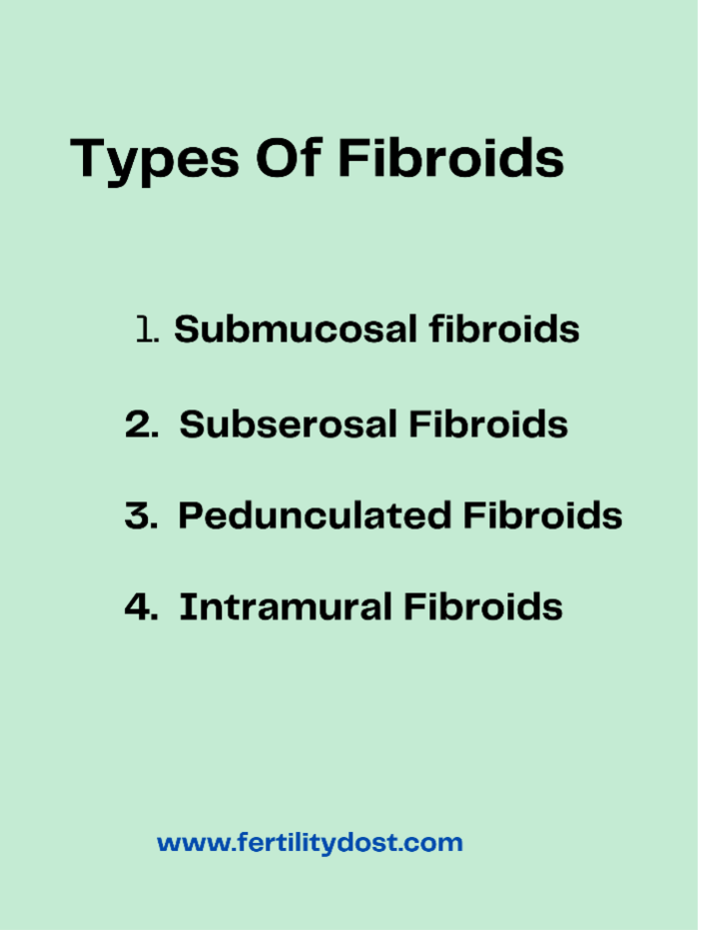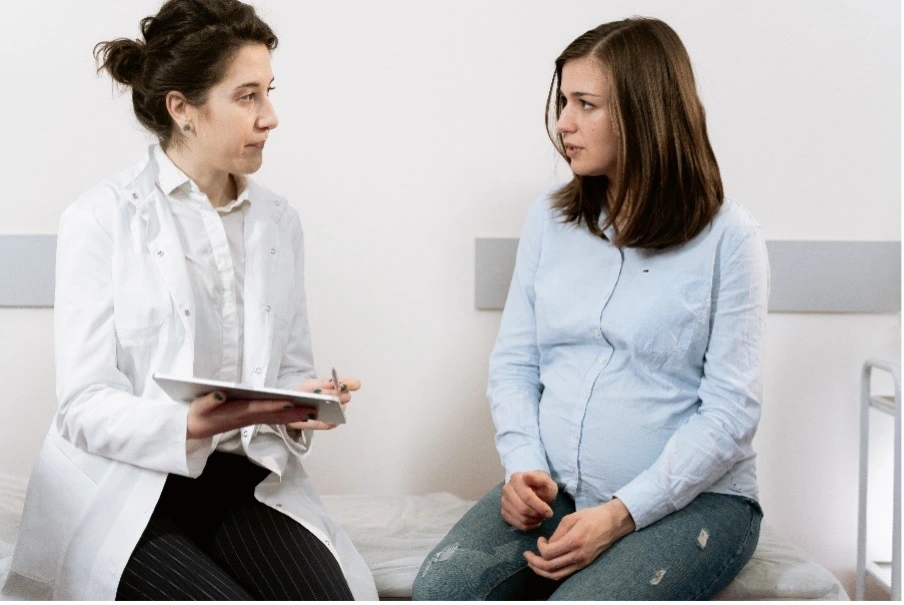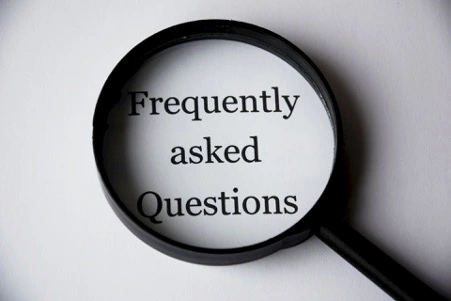Trying To Conceive With Fibroid And Cysts? | What Is Fibroid Pregnancy And Ovarian Cysts?
Infertility
One of the common reasons of infertility in women is due to fibroids and cysts. They both affect women during their reproductive age. The major difference between the two is that fibroids develop in the muscular lining of the uterus called as uterine fibroids, while cysts are formed in or on the ovaries called as ovarian cysts.
Many women may not be aware about having cysts or fibroid because either it is misinterpreted as period pain or is asymptomatic. Only in circumstances when pain is unbearable, heavy bleeding or facing conception issues that a women seek medical help. In this article we will be focusing on fibroid pregnancy and whether an ovarian cyst cause infertility or not?
Let’s start with Fibroids and Pregnancy with Fibroids.
What Are Fibroids?
- Fibroids or uterine fibroids are dense, firm and non-cancerous tumors.
- They develop from muscle layer of the uterus.
- Fibroids can grow outside the uterine wall, inside the uterine cavity or within the uterine wall.
- Size of fibroids can be as small as a pea or larger than a grapefruit.
- A woman may have multiple fibroids of different sizes at a time
- 40% to 60% of women have fibroids by age 35 and 80% have it by age 50.
- Fibroid pregnancy can be either normal or with complication depending upon the size and location of the fibroid in uterus.
- Causes of Fibroids – Though it is not clear what causes uterine fibroids but female sex hormone levels and genetics might be the cause. Other than this, family history of fibroids, obesity and red meat is also considered to be a potential cause for fibroids.
Despite Low AMH I Conceived Naturally With Holistic Fertility Management
Fibroid Symptoms
Most of the women have expressed that they didn’t have any symptoms. However, if you do feel some changes then the most common symptoms include-
- Pelvic Pain
- Pain during sex
- Bloating
- Heavy or painful periods
- Prolonged periods
- Low back pain
- Infertility
- Miscarriage or preterm labor
- Frequent urination
- Rectal pressure
- Enlarged abdomen
Types Of Fibroids

Fibroids may impact different women differently on the basis of their size, nature, shape, and location. Typically, researchers and medical experts have classified fibroids into 4 categories:
1. Submucosal fibroids
Located in the submucosa or below the tissue lining of the uterus, they are the rarest kinds of fibroids. They often protrude into the uterine cavity
2. Subserosal Fibroids
In comparison to submucosal fibroids, these are found on the outer lining of the uterus.
3. Pedunculated Fibroids
These are the types of fibroids seen growing on the stalks and stems and can grow either on the inside or outside of the uterine cavity.
4. Intramural Fibroids
As the most commonly found fibroids, they grow and are contained within the uterine wall.
Can Fibroids Cause Infertility?
A commonly believed principle is that fibroids lead to infertility but this is not true!
There are some studies that suggest a link between fibroids and infertility however this in no way means that every woman who has fibroids is infertile. Only a doctor will be able to analyze the cause of infertility. However, that being said, there are some risks associated with pregnancy and fibroids-
- Fibroids may in some cases alter the amount/ quantity of sperm that can enter the uterus making it difficult for conception.
- Blood flow to the uterus may be affected by the presence of fibroids and this may cause embryo implantation failure either in the case of natural conception or via IVF
- Sometimes, the growth of fibroids in the fallopian tubes may prevent eggs from being released to the uterus preventing conception.
- The growth of fibroids along the uterine wall may prevent the embryo from properly developing and can in some cases result in miscarriages.
- In pregnant women, fibroids may sometimes become the source of severe pain.
- There is also an increased chance of preterm delivery, and cesarean section if a woman has fibroids.
Does Fibroid Affect Pregnancy?

Not always! Yes, you heard it right.
Many women with fibroids get pregnant naturally and have normal pregnancies without any treatment. However, in some cases fibroids can impact your pregnancy.
How Are Fibroids Treated During Pregnancy?

Treating fibroids during pregnancy is difficult because of the risk involved to the fetus. Bed rest, proper hydration, diet and mild pain relievers may be prescribed to manage the symptoms.
Only in exceptional cases, a myomectomy can be performed that too in the second half of the pregnancy to remove fibroid from outside or within the uterine wall. Fibroids in the uterine cavity are not treated due to possible risks to the fetus.
Knowing the size, position, number and type of fibroids will help you to understand the complications of fibroid pregnancy in each trimester and afterwards.
Fibroid Pregnancy In First Trimester
- Approximately two thirds of fibroids will grow or shrink during pregnancy. If growth occurs, it is mostly during the first trimester because your body produces more estrogen which is a hormone that helps fibroids to grow.
- This leads to excessive pain, bleeding or miscarriage.
Fibroid Pregnancy In Second And Third Trimester
- In second and third trimester, the uterus is expanding to make space for the baby to grow and survive. While doing so, the uterus might push against your fibroids which leads to excessive pain, placental abruption or preterm delivery.
Fibroid Pregnancy During Delivery
- Because fibroid is coexisting in the uterus with the baby, it can disturb the contracting process during delivery, can also block the birth canal and might prolong the labor pain.
- Women having fibroid pregnancy are six times more likely of having a cesarean or C-section delivery.
- It can also cause breech birth where instead of head coming first from the birth canal, the baby’s butt or feet comes out first.
Fibroid Pregnancy After Delivery
- Postpartum hemorrhage – Poor contracting can lead to bleeding after delivery. Postpartum hemorrhage is a medical emergency because women experience heavy vaginal bleeding within 24 to 48 hours after delivery.
- 70 % of the women have expressed that fibroid shrinks after the delivery within 6 months.
Busting The Myths Around Fibroids & Infertility

As with any case, there tends to exist several myths where there is a lack of information. Several myths regarding fibroids exist and here we attempt to break down some of the most common myths.
Fibroids Always Lead to Infertility
Although fibroids can cause some difficulties in conceiving and during pregnancy, they are not directly related to fertility in any way. Having fibroids does not automatically make you infertile. Infertility may be caused due to a number of underlying reasons such as hormonal imbalances, poor egg or sperm quality, and having a weak uterus. If you are unable to conceive, there is a high possibility that it is not due to the fibroids but some other reason and you must consider visiting a doctor.
All Fibroids are cancerous
Often, women get scared and panic when they are told that they have fibroids as they are often associated with cancer. But the truth is, not all fibroids are cancerous. In fact, a majority of fibroids are non-cancerous and possess no danger to the life of a woman. In any case, your doctor will help you identify the fibroids, nature of them and with a few standard tests be able to assess whether or not they are cancerous and based on that suggest a course of action.
Fibroids must always be surgically removed
Yet another common myth surrounding fibroids is that they always have to be removed but that is far from the truth. In most cases, your doctor will recommend you not to undergo any procedure for the removal of the fibroids. However, in a case where there is a chance that the fibroids may be cancerous or are located in the fallopian tubes blocking the release of eggs, your doctor may suggest getting them surgically removed or provide you with certain medications to help relieve symptoms. Fibroid treatments are an open range and you can consult your doctor to understand the details.
Removal of All fibroids require a massive surgery
Yet again, this is a misunderstanding. Earlier, due to the lack of development in the field of medical technology, there was a need for invasive surgeries to get rid of fibroids but thanks to the latest developments, fibroids can now be easily dealt with using procedures such as artery embolism or myomectomy. Upon consultation with your doctor and a complete assessment of your condition, a doctor will be able to recommend the correct form of fibroid treatment.
Treatment : How are Fibroids Treated?
It is recommended to treat fibroids before pregnancy. Hence, if you are planning for conception a pre-conception consultation with your doctor is must to avoid any risks that can affect your pregnancy.
The most common treatments for fibroids are :
Gonadotropin-releasing hormone (Gn-RH) agonists
This medication blocks the production of estrogen and progesterone to put you in a menopause like state. Once the menstruation stops, fibroids shrink.
Progestin-releasing intrauterine device (IUD)
This medication relieves from heavy bleeding due to fibroids. This doesn’t not shrink or eliminate fibroids.
Uterine artery embolization
This non-surgical procedure is done to cut the blood flow to fibroids causing them to shrink and eventually eliminate.
Radiofrequency ablation
With the help of radiofrequency energy, the fibroids are destroyed. It is a non-surgical procedure.
Laparoscopic or robotic myomectomy
A surgical procedure where the surgeon removes the fibroids and reconstruct your uterus.
Hysteroscopic myomectomy
If you are having submucosal fibroids, this surgery is performed to remove fibroids. An instrument is inserted through vagina and cervix into the uterus.
Cysts also is one of common reasons of infertility in women. But often people get confused between fibroids and cysts.
Now, let’s understand about cysts and how it affects your fertility.
What Are Cysts?
- A solid or fluid-filled sac within or on the surface of an ovary is called cyst.
- Because the cysts grow only in or on the ovaries it is called ovarian cysts.
- Most ovarian cysts cause little or no discomfort and are harmless.
- Majority of the ovarian cysts disappears without any treatment within a few months.
- Ruptured ovarian cysts can be alarming for your fertility health.
- Causes of ovarian cysts are hormonal issues, PCOS, Endometriosis, pregnancy, pelvic infections.
Symptoms Of An Ovarian Cyst
- Abdominal bloating
- One-sided abdominal pain
- Pelvic pain before or during the menstrual cycle
- Painful sex
- Painful periods
- Painful bowel movements
- Breast tenderness
- Pain in lower back or thigs
- Nausea
- Weight gain

Can An Ovarian Cyst Cause Infertility?
Cysts are of different types. If you are having functional cysts then they wont cause infertility. Cysts due to endometriosis or Polycystic Ovary Syndrome (PCOS) might be the cause of infertility during conception and needs to be treated medically or surgically depending upon the severity.
To know more about endometriosis and PCOS read our well researched articles on the same
Can I Get Pregnant With Endometriosis?
PCOD Diet Guidelines To Cure, Manage & Treat Hormonal Imbalance
Treatment : How Are Ovarian Cysts Treated?
Wait and Watch
Many a times, cysts disappear on its own. So, if you have a small, simple, fluid-filled cyst then wait and watch followed by doctor’s recommended tests to keep a check.
Medication
Hormonal pills like birth control pills are very effective in regulating your menstrual cycle and to keep ovarian cysts from recurring. The pills wont shrink the cysts.
Surgery
A surgery is required when the cyst is large, growing and causes excessive pain.
How To Naturally Treat Fibroids And Cysts At Home?
- Women having cysts or fibroids must try to include colourful fruits and vegetables like bell peppers, berries etc which are rich in antioxidants and help to reduce the symptoms of disease.
- One must try to cut back on alcohol and caffeine because they cause more inflammation.
- Try to increase vitamin D levels in the body naturally by absorbing natural sunlight or through foods that are rich in vitamin D such as eggs, milk, soy milk, etc.
- Avoid processed packaged foods and high sugar foods that may increase inflammation and pain.
- Eat plenty of fruits and vegetables such as apples, tomatoes, cabbage, broccoli that prevents the development of fibroids.
- Include whole grains and healthy organic eating choices.
- Don’t eat diet containing red meats.
- One must keep a close check on blood pressure. Women having high blood pressure are more likely to have the problem of cysts and fibroids. So, try to control your blood pressure through by reducing salt in diet you consume, by exercising and by avoiding processed foods that are rich in salt.
- Include plenty of green leafy vegetables that help to lower the risk of fibroids and cysts and also help to reduce the ongoing symptoms and pain.
- Try to balance estrogen levels in body and weight of the body because fat cells produce more estrogen and which in turn increase the risk of fibroids and cysts in the body.
- Include green tea that help to slow the growth of fibroids and cysts and reduces inflammation.
- Try to manage stress and indulge in yoga or meditation.
- Add potassium rich foods such as dates, lentils, avocado, citrus and bananas in your daily diet.
Fertility Dost strongly recommends you to prepare your body and mind before natural or IVF conception. Fibroids and cysts don’t show symptoms most of the times but might affect your pregnancy later. Our Fertility Coach Program helps you to understand your body and boost your fertility health. Connect with us to start your pregnancy journey on a healthy note.
Book Your Free Consultation Now!







Your Comment Is Valuable For Us
Thanks For Your Feedback.